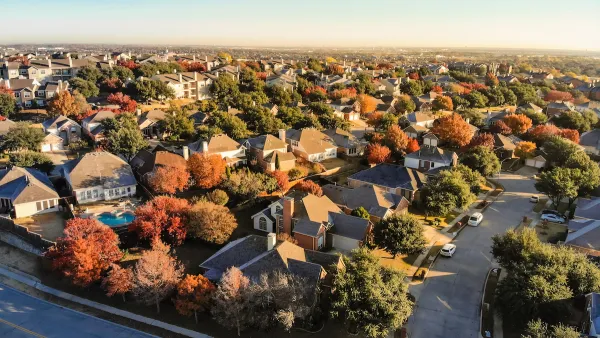A new study makes a visual case against the narrative that spot zoning and a broken development approval process are running roughshod over the entire city.

Steven Sharp shares news of a new study [pdf] released by the UCLA Anderson Forecast and the UCLA Ziman Center for Real Estate that puts the planning and development approvals process in context by aggregating all of Los Angeles' zoning changes for specific parcels, which the study describes as "spot zoning."
The study comes at a time of controversy over the planning process and the impacts of development in the city. The findings of the report, however, probably run counter to the narrative of runaway development preferred by advocates for the Neighborhood Integrity Initiative.
Authored by C.J. Gabbe, the study identifies properties with zoning changes of two kinds: those that allowed for more residential density and those that allowed for less density. Here Gabbe summarizes the findings:
Zoning designations were largely static: On average, the City upzoned 225 acres and downzoned 216 acres annually between 2002 and 2014. (Los Angeles' total land area is about 300,000 acres.) That is less than two-tenths of one percent of its land area every year.
Another provocative layer of conclusion drawn from the report's findings: in Los Angeles, "the most desirable neighborhoods with access to valuable amenities are also the most difficult to upzone."
FULL STORY: When and Where Does Upzoning Actually Happen?

Analysis: Cybertruck Fatality Rate Far Exceeds That of Ford Pinto
The Tesla Cybertruck was recalled seven times last year.

National Parks Layoffs Will Cause Communities to Lose Billions
Thousands of essential park workers were laid off this week, just before the busy spring break season.

Retro-silient?: America’s First “Eco-burb,” The Woodlands Turns 50
A master-planned community north of Houston offers lessons on green infrastructure and resilient design, but falls short of its founder’s lofty affordability and walkability goals.

Test News Post 1
This is a summary

Analysis: Cybertruck Fatality Rate Far Exceeds That of Ford Pinto
The Tesla Cybertruck was recalled seven times last year.

Test News Headline 46
Test for the image on the front page.
Urban Design for Planners 1: Software Tools
This six-course series explores essential urban design concepts using open source software and equips planners with the tools they need to participate fully in the urban design process.
Planning for Universal Design
Learn the tools for implementing Universal Design in planning regulations.
EMC Planning Group, Inc.
Planetizen
Planetizen
Mpact (formerly Rail~Volution)
Great Falls Development Authority, Inc.
HUDs Office of Policy Development and Research
NYU Wagner Graduate School of Public Service




























